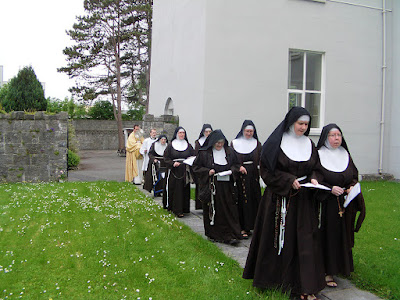In 1929 in a particular part of New York city, several wealthy businessmen committed suicide, around the same time. Why? Because of what became known as ‘the Wall Street Crash.’ The New York stock exchange collapsed over night and as a result many people lost millions of dollars. Many of them could not handle this and sadly took their own lives. Money for them had become everything. It was their god and it had just proved itself to be a false god, an illusion. When their god collapsed, they were left with nothing, no money, no faith and apparently nothing to live for. It seems that many of them despaired.
Around the time when I was ordained, two women friends of mine, Marina Hayden and Maura Grealish, both professional accountans, took their final vows in the Poor Clare convent in my home town of Galway. They took four vows: poverty, chastity, obedience and enclosure. They will never own anything of their own, they will not get married, and they will spend the rest of their life enclosed in a convent, dedicating their time and energy to God and to praying for all of us and for many others. Some would consider this a useless waste; others see it as the gift of God which it is, the highest calling in the Church. Their lives lived in this way—as with any religious—is a sign that we believe in the life to come and that it is worth making sacrifices for it. If we didn’t believe in the life to come, then it would be a waste of time.
How are the two related? Well I suppose they are really the opposite of each other. Those in Wall Street and in the business world sometimes put everything into their money. Money can become the only thing that matters. They work for it, they live for it, they may even lie and cheat for it. On the other hand Sister Gabriel and Colette, have given up everything for God, and are depending totally on God for everything.
Most of us are probably somewhere between the two. We may not be millionaires, but we have not given up everything for God either. We work and try and put bread on the table and provide for our families and loved ones. Most people are under a lot of pressure to pay their bills and mortgages, etc.
 |
| Poor Clare Sisters, Galway, Ireland. |
Money is an important tool. It would be very hard to live in our society without it, but it is only a tool. If we lost everything over night it would be very difficult, but we would still be alive. It happens to people every so often, but we do survive. But if God disappeared, what would we have left? When we died there would be nothing. Thankfully God does not disappear, regardless of whether we have more than we need, or barely enough to survive on. Either way God is waiting for us and when we have served our time on this earth then we will go to him.
In the Gospel Jesus gives us this parable of the rich man—traditionally known as Dives—and Lazarus. The rich man is condemned to hell, not because he is rich, but because he only focused on himself and ignored those who were in need. It says that Lazarus lay at his door. In other words, he couldn’t have missed him and said that he didn’t know he was there. It also says that he was covered in sores, which implies he was sick and so unable to help himself, but the rich man still ignored him.
God is reminding us that we have a moral obligation to help those who are less fortunate than we are and there are always plenty of people around us who are in need. We get several phone calls a day looking for help, with bills, food, housing. They are usually looking for St. Vincent de Paul Society, but it is a reminder of how many people are in need.
‘Why don’t they go out and get a job,’ you may ask? Many people who are in need are working, but are often barely surviving. Just this past week a man called me asking me if I could help an elderly lady find accommodation. He had found her lying on a bench. We did our best to help her, but in the course of the conversation, I realized that although this man was working and had stopped to help this other lady, he himself was living out of his truck. He had part of a deposit on an apartment and was working to try and make the rest of it, but wasn’t getting enough work to make it. He had been living out of his truck for weeks. He wasn’t asking me for help, but when I realized this we were able to help him out and he now has a place to live. And when I say ‘we’ I mean St. Vincent de Paul Church and thanks to donations you have made.
When we live in a world that places so much emphasis on having plenty of money, it’s hard not to be affected by it. There is nothing wrong with having money so long as we remember that it is only a tool to help us survive. It is not primarily what our life is about. We are body and spirit and that spirit will never be satisfied with material things alone.
You also have to be wise about how you use your money to help people. I’m sure I have been ripped off as many times as I have been able to help someone really in need, but it doesn’t matter. All that matters is that we do our part to make good use of what God has given us.
In the parable, note how the rich man although now in hell, is still focused on himself. He asks that Lazarus come and comfort him. He is still arrogant. He hasn’t learnt.
‘In his riches man lacks wisdom. He is like the beasts that are destroyed.’ (Psalm 49)












